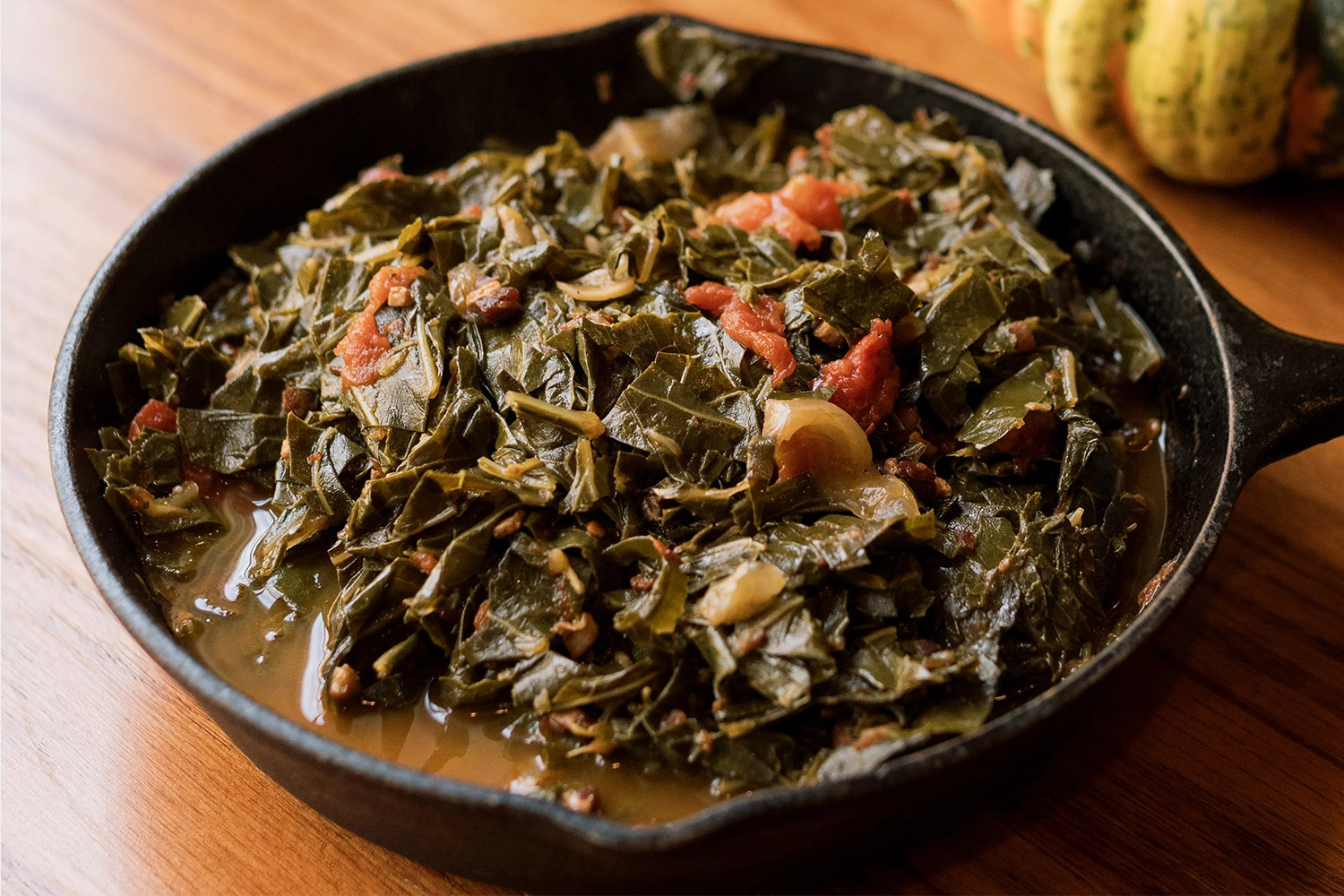Often consumed on January 1 to bring good fortune in the new year thanks to their passing resemblance to green American currency, collard greens are often slow-cooked down with smoked turkey, pork neck bones or some other type of meat to create a flavorful potlikker that can be enjoyed as a simple meal or a briny side dish. A member of the brassica family that includes other nutritious vegetables like kale and broccoli, collards are often cooked for hours with the prevailing wisdom being that the longer the greens cook, the better they’ll be.
Trevor Stockton grew up eating greens harvested from the garden of his grandparents’ 180-acre farm in Jackson County in the middle of Tennessee and, as the current executive chef at the Restaurant at RT Lodge on the campus of Maryville College about 20 miles south of Knoxville, he co-signs that logic.
“With collards, I learned the final product is going to be much better if you really focus on the process of it,” Stockton tells InsideHook. “You can give 10 different people all the same ingredients, but the process of cooking them is what’s going to yield the best final product. Collards are a great example of coaxing certain flavors out of things.”
One of the techniques Stockton employs to coax maximum flavor out of his greens is braising them with hickory-smoked Benton’s bacon before adding ingredients like caramelized onions, fresh sliced garlic, tomatoes, pepper and white vinegar into the mix.
“It’s super smoky bacon, and collard greens are one of the few things that can stand up to that flavor because they are so earthy,” he says. “One of the reasons I use bacon instead of ham is you can start without oil or butter of any kind. There’s enough fat that, once it renders, you have bacon fat in the pan to add your onions into so they’re cooking in that flavor. Collards can handle all of that smokiness.”
Thanks to Stockton’s informed ingredient choices and thought-out cooking process, his collards avoid the bitterness that’s sometimes present in hearty greens, including turnip and mustard greens.
“If you eat a beet raw, it tastes like dirt,” he says. “But if you roast it for four hours, it brings out the natural sugars and the sweetness in it. It’s two very different things. If you cook collard greens right, the balance of flavors can be really perfect. Without it, they can be very bitter and overpowering. I’ve never eaten collard greens anywhere else that uses tomatoes, but they lend some acidity and sweetness that really help balance it out.”
The First Rule of Making Competition-Style Texas Chili? No Beans Allowed.
Spoon up this recipe from “The Big Texas Cookbook: Food That Defines the Lone Star State”In addition to using Benton’s bacon and tomatoes, Stockton’s third tip for making good greens has to do with the collards themselves.
“Getting fresh collards from a local farm is going to produce a much better end product,” he says. “You can make any collards taste good if you add a bunch of stuff to them, but if you have quality greens to start with, it’s going to yield a better product at the end. The fresher they are, the more tender they are. They’re not as chewy and fibrous as the ones that have been sitting around for two weeks at the store.”
Whether you’re already a fan or ready to give collard greens another go, here’s Stockton’s recipe.
RT Lodge Collard Greens
Prep Time: 15 minutes
Cook Time: 2 hours
Total Time: 2 hours, 15 minutes
Ingredients
- 4 bunches fresh collards (Thick rib removed, rinsed, cut in 1”x2-3” pieces. Doesn’t need to be exact, just make sure the pieces aren’t too big.)
- ½ lb. bacon, preferably Benton’s (cut in small lardons approximately ¼”x ¼”x1”)
- 2 yellow onion (peeled, julienned)
- 1 head fresh garlic (peeled, sliced thin)
- 1 lb. can diced tomatoes or 1 lb. fresh tomato, diced
- 1 tsp. crushed red pepper
- 2 tbsp. salt
- 1 tbsp. black pepper
- 2 cups white vinegar
Directions
-
-
Heat a heavy-bottom stock pot or Dutch oven over medium-high heat.
-
Add bacon and cook until almost crispy.
-
Add onion, salt, pepper and crushed red pepper. Cook until the onion just starts to brown.
-
Add sliced garlic and cook another 2-3 minutes.
-
Add tomato and stir often until tomato starts to stick to the bottom of the pot.
-
Add collard greens, vinegar and enough water to cover everything.
-
Cook another 2 hours on low-medium heat.
-
After 2 hours, monitor the progress, and either serve or keep cooking a little longer. The final product should be moist, but not swimming in liquid.
-
Join America's Fastest Growing Spirits Newsletter THE SPILL. Unlock all the reviews, recipes and revelry — and get 15% off award-winning La Tierra de Acre Mezcal.
